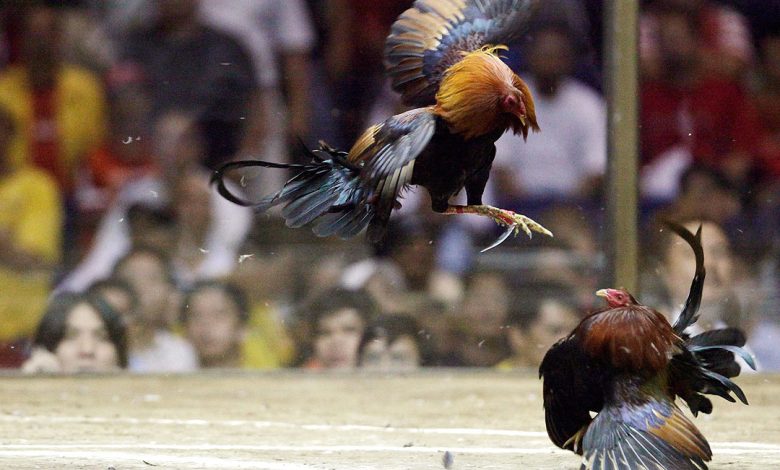Duterte stops e-sabong operations

Roosters are seen during a cockfight bout in Manila, Jan. 24, 2009. — REUTERS
By Kyle Aristophere T. Atienza, Reporter
PRESIDENT Rodrigo R. Duterte said on Monday he will order the termination of online cockfighting operations in the Philippines, after earlier flaunting the hundreds of millions of pesos in government revenues generated from these games.
At the Cabinet meeting televised on Tuesday morning, Mr. Duterte said his order was based on the recommendation of Interior Secretary Eduardo M. Año, who was tasked to do a survey on the social costs of online cockfighting, also known as “e-sabong.”
“The recommendation of Secretary Año is to do away with e-sabong and he cited the validation report coming from all sources,” he said. “So it’s his recommendation and I agree with it, it’s good, so e-sabong will end.”
Mr. Duterte’s sudden decision to stop online cockfighting operations might force operators and their workers to go underground, according to policy analysts.
Stopping e-sabong operations abruptly without providing a clear strategic roadmap for affected sectors would likely force small-time operators and their workers to operate illegally, said John Paolo R. Rivera, an economist at the Asian Institute of Management.
“Just like the other gambling operations suspended, this latest decision might temporarily fail to totally disenfranchise operations,” he said in a Viber message.
“Other operators may continue operating underground…The unintended consequences of this sudden decision would kick in.”
Jefferson A. Arapoc, an economist at the University of the Philippines (UP) Los Baños, said underground e-sabong operations are expected to flourish as the government has shown it is unable to regulate online activities such as scams and sex trafficking.
“The Duterte administration’s order to stop e-sabong operations would depend on the government’s capability to implement it,” he said. “His decision could have done more damage than good — imagine the government losing revenues while e-sabong continues to thrive in the underground economy.”
Mr. Duterte previously refused to suspend e-sabong because of the revenues it generates for the government, which saw its budget deficit widen during the pandemic.
The Philippine Amusement and Gaming Corp. (PAGCOR) earlier estimated revenues from online cockfighting averaged P400 million monthly last year and P640 million a month since January 2022.
Mr. Duterte acknowledged that the government’s previous stand was only based on e-sabong’s economic benefits.
“It’s working against our values,” he said of the game. “The impact on families and on people, it turns out players are not sleeping for 24 hours.”
E-sabong gained popularity during the pandemic, as Filipino gamblers only needed to place bets using their mobile phones. However, the disappearance of at least 30 people allegedly linked to online cockfighting sparked a Senate investigation and prompted calls for its suspension.
Sought for comment, PAGCOR Chair Andrea D. Domingo said via text message that the regulator has to implement the President’s decision.
“We are duty bound to follow whatever is the decision of the President on e-sabong, which I am sure is always guided for the people in general,” PAGCOR President and Chief Operating Officer Alfredo C. Lim said via Viber.
Mr. Duterte gave Mr. Año until Tuesday (May 3) to finalize the order to terminate e-sabong operations. As of 5 p.m. yesterday, Malacañang had yet to release the order.
“Providing no certainty as to the exact date of the closure is unhelpful,” said Michael Henry Ll. Yusingco, a fellow at the Ateneo de Manila University Policy Center. “This date should have been settled before the announcement was even made.”
Mr. Yusingco said Mr. Duterte’s decision might push Congress to evaluate the domestic gaming industry and make it more responsive to emerging security and social threats.
“The broader context, the responsibility of re-examining the gaming industry falls on Congress,” he said in a Messenger chat.
“Establishing a legal framework that is responsive to the times is the job of our legislators… So the future of this revenue-generating activity, and similar activities as well, is in the hands of our lawmakers.”
Congress has been urged to pass a law regulating online cockfighting. PAGCOR previously issued licenses to several e-sabong operators.
Mr. Yusingco said lawmakers should ensure “public safety and the general welfare are protected in the gaming industry now that we are on the path of digitalization.”
“E-sabong is only one activity, it should be examined among many others in a holistic way, including all forms of gambling,” said Edna Estifania A. Co, a professor and former dean of the UP National College of Public Administration and Governance.
“The government should rationalize its decisions by weighing the positive and negative aspects in terms of management. Financial gains, regulatory framework, and social impacts,” she added.
Senators welcomed Mr. Dutere’s latest decision.
“The suspension of e-sabong operations in the country, while delayed, will pave the way for families to recover from their financial losses,” Senate President Vicente C. Sotto III said.
Senator Ronald M. dela Rosa, who previously pushed the President to suspend e-sabong, said there is no time for Congress to act on a bill that would transfer the authority to issue permits for e-sabong operators from PAGCOR to Congress.
“(This) would mean demise of the e-sabong industry unless the next administration would decide to resurrect it,” he said.
Senator Francis N. Pangilinan, meanwhile, said the debates on e-sabong should be left to the next Congress to give lawmakers more time to assess the popular online game. — with inputs from Tobias Jared Tomas




